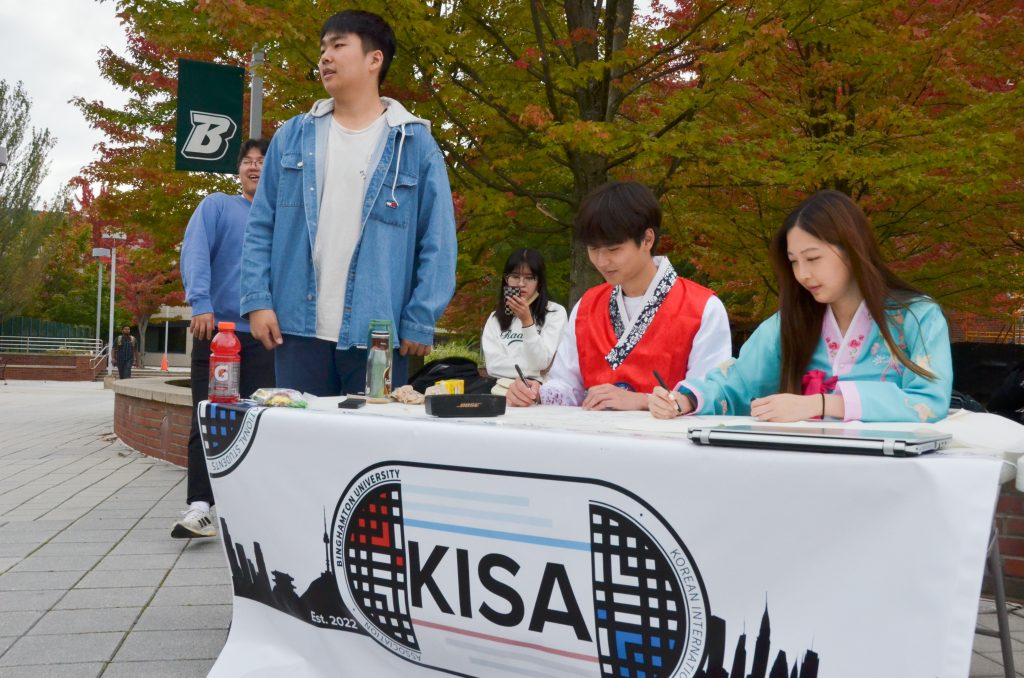In celebration of Hangul Day, the Korean International Student Association (KISA) tabled on the Binghamton University Spine with activities honoring Korean language and culture.
On Sept. 29, KISA held a Korean calligraphy writing contest and offered an opportunity for students to try on traditional Korean attire known as hanbok. Students were invited to copy a phrase in Korean with a calligraphy pen and were then entered into a drawing for the best Korean writing. KISA also provided a photo opportunity with the E-Board for students who participated in hanbok fitting.
Hangul Day commemorates the standardization of the Korean writing system in the 1400s. The Hangul writing system was introduced by King Sejong the Great in the Joseon Dynasty in an attempt to create a uniquely Korean writing system. Prior to the introduction of Hangul, Chinese characters were used to represent the spoken Korean language.
Seungbeen Lee, copresident of KISA and a senior double-majoring in accounting and business administration, described the historical significance of Hangul Day.
“Before the creation of [Hangul], there were no Korean characters even though we had our own spoken language, so Chinese characters were borrowed and used,” Lee wrote in an email. “Because Chinese characters did not align with [the] Korean language, it was notoriously hard to learn and use in [the] proper way, and the illiteracy rate of ordinary people who had difficulty getting an opportunity to be educated was quite high.”
As a result, King Sejong created Hangul for the purpose of increasing literacy for the common people. Lee went on to explain the impact of Hangul on Korean culture and history.
“Hangul Day is an important day to appreciate Hangul, which played a major role in building our country, [emphasizing] the preservation of language and [strengthening] national consciousness together,” Lee wrote.
KISA collaborated with Uway Global, an institute committed to helping Korean students study abroad, for the Hangul Day event. Lee explained the importance of the event for KISA.
“We are trying to promote this because we are proud of the language itself, our culture itself, our heritage,” Lee said. “That’s why we’re promoting it here, so we can expose the Hangul to the public.”
KISA aims to support Korean international students at BU throughout their schooling at the University. The organization provides academic, social and cultural support for students transitioning into life at an American university. Established in Spring 2022, KISA is currently working toward becoming a Student Association (SA) chartered organization.
Jiwoong Baek, event coordinator of KISA and a junior majoring in accounting, explained the mission of KISA.
“Our KISA is basically helping out the Korean international students,” Baek said. “There is KASA, which is more about the Korean American [students], but we’re trying to help out the Korean students who are the first here in the United States because they haven’t been here before and are very nervous. So we give them academic support and give them opportunities to do cultural exchange with American culture and Korean culture.”
Suhyeon Kwon, copresident of KISA and a junior majoring in neuroscience, conveyed the organization’s commitment to helping international students navigate the American collegiate system.
“The system itself is totally different than Korea, so we’re just trying to focus on helping them, just adapting to this culture and the school itself,” Kwon said. “We’re also helping them to socialize, because there is definitely a language barrier and cultural differences. So we’re just helping them to bridge that gap.”
KISA’s future plans include collaborating with organizations in the Asian Student Union (ASU) to increase KISA’s recognition and gather insight from more established clubs. Additionally, the organization plans on supporting students through mentorships in alignment with their mission.
Lee elaborated on what being involved with KISA means for him.
“I feel responsible for commitments to help people to thrive, as I got help during my first year at [BU],” Lee wrote. “Being involved in [a] wider and diverse college community [provides] more chances to think about my identity as I promote and share Korean culture as it gets more [recognized] in the [United States]. I feel like I could have a positive impact on society and individuals’ lives, [and] I am very committed to and proud of it.”



